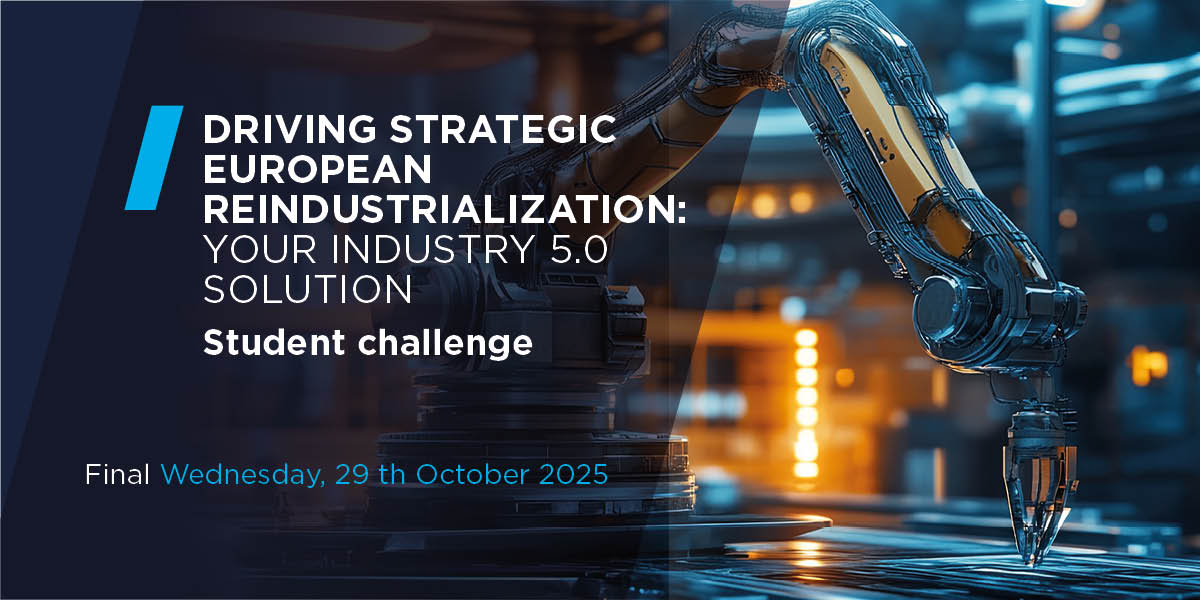On October 29th, at Industrie Fluviali in Rome, the fifth edition of the EGC Student Challenge came to a close — our annual event where students and business leaders meet and collaborate to shape the future.
This year’s challenge? To propose an innovative idea capable of interpreting the new European industrial landscape. The fragmentation of value chains, the need to ensure energy security, and the accelerated spread of technologies such as artificial intelligence are pushing organizations to build production models that are more resilient, circular, and human-centric.
Which strategies, solutions, and supply chains will be required to enable a European reindustrialization that promotes the development of innovative technologies and the efficient, sustainable, and inclusive management of critical products and materials — in line with the principles of Industry 5.0?
This year, 180 students from 20 universities took part in the Challenge, presenting 50 projects that explored the key challenges of European reindustrialization through concrete and actionable solutions. The proposals ranged from sustainable waste valorization to the optimization of production processes and energy consumption, with a shared focus on the integration of digital technologies (AI, Blockchain) and environmental sustainability principles.
Among these, four finalist teams were selected, each presenting innovative ideas: from an industrial energy community to EV battery second-life systems, from circular fashion using bio-based materials to an upskilling platform designed to close the Industry 5.0 skills gap.
THE FINALIST TEAMS & THEIR PROJECTS
Four teams, chosen from more than 50 submissions, presented their proposals in front of the jury and the audience — which, for the first time, also took part in the evaluation through a digital public vote.
Team Spark4Change – Annalisa Pacilio, Noemi Marrone, Rosa Pannone, Maria Celeste Sonatore
With “Energy Symbiosis Network 5.0: Smart Energy for Industrial Resilience”, the team proposed a platform that enables companies within the same industrial district to share energy and recover waste heat, transforming each site into an energy prosumer. A model that strengthens local resilience while contributing to the decarbonization of manufacturing.
Team ReNatura – Josh Trexler, Tehya Love McElroy, Sarah Weingarten
With “Transform Food-Industry By-Products into Sustainable Textile & Leather Alternatives,” the team presented a B2B business model based in Milan that converts food-industry by-products (such as grape pomace, citrus peels, and coffee grounds) into textile materials and plant-based leather alternatives, promoting local and circular supply chains.
Team CircularEV – Donato Gioia, Giovanni Madoni, Mattia Marino
The project “CircularEV: AI & Blockchain for Second-Life Batteries” introduces a digital platform that assesses, tracks, and re-routes end-of-life EV batteries toward new applications, reducing waste and accelerating the energy transition. An approach that combines technological innovation and sustainability, redesigning circularity in the electric vehicle ecosystem.
Team Veloura – Liah Cohen, Iida Silvola
The project “Turning EU Skills Policy into Factory-Ready Talent” proposes a system that analyzes workforce data to identify the skills companies require, matching them with European training programs. A practical bridge between EU policy and industrial operations, designed to accelerate the preparation of the workforce needed for Industry 5.0.
THE DIALOGUE BETWEEN MANAGERS & STUDENTS
The event enabled an open discussion on the theme of European Reindustrialization and Industry 5.0, thanks to the presence of our guest speakers, who shared their experience and perspectives on the challenges of today and tomorrow.
Opening the discussion was Antonio Fois, Partner at Eurogroup Consulting, who emphasized the value of this space as a meeting point between generations, viewpoints, and responsibilities. His remarks highlighted how the Student Challenge is not only a competition, but a true collaborative laboratory, where those currently leading industrial transformation engage with those who will shape its future.

The theme of European reindustrialization and the need to build resilient value chains was addressed by Giuseppe Allocca, Teva Haarlem Site General Manager at Teva Pharmaceutical, who highlighted how the future of industry relies on the adoption of Industry 5.0 principles and on structured cooperation between public and private actors. Such collaboration is essential to support strategic sectors and to ensure long-term resilience, economic value, and public health security.

Giovanni Citarelli, Regional Supply Chain Manager at Arkema, emphasized the deeper meaning of the new industrialization: not simply bringing production back to Europe, but fostering a cultural transformation that places people, local communities, and the quality of work at the center of innovation. As he noted, Industry 5.0 is not just about technology, but about collaboration, well-being, and the development of skills capable of sustaining long-term change.

Federico Caracciolo, Managing Director at Athlon, highlighted that Industry 5.0 is not simply about automation or digitalization, but about a new model of innovation in which technology serves people — not the other way around. This transformation requires human skills such as creativity, empathy, and adaptability, qualities that the new generations are naturally bringing into organizations.

Closing the discussion was Enrico Bovi, Customer Engagement Platform Lead at Pfizer and judge of the 2024 edition, who offered a concluding reflection on the role of educational competitions in bringing forward new ideas and new ways of interpreting change. His contribution highlighted that innovation requires not only creativity, but also the ability to communicate, defend, and develop a project as it evolves.

THE WINNING TEAM
The day concluded with the announcement of the winning project, “AI & Blockchain for Second-Life Batteries”, developed by the CircularEV team from Luiss Guido Carli. A solution that combines technology and sustainability to give new life to end-of-use batteries, promoting a circular economy model within the electric vehicle sector.
Our congratulations — together with those of the distinguished jury — also go to the other finalist teams, who presented innovative and concrete projects, demonstrating a high level of awareness and maturity in addressing the challenges of European Reindustrialization and Industry 5.0.


